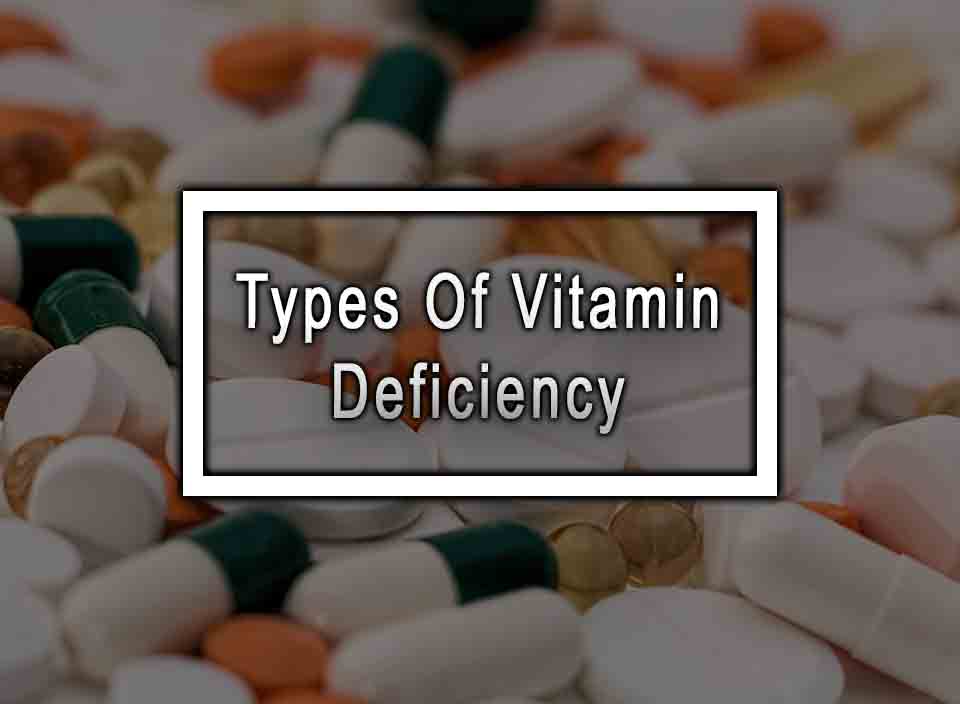Table of Contents
ToggleHere Are Types Of Vitamin Deficiency, Causes, Symptoms, And Treatments
Vitamin deficiency is a condition where the body lacks certain essential vitamins that are necessary for normal metabolism. When the body does not get adequate vitamins, it ultimately leads to some health complications. Vitamins are vital nutrients that are required in small quantities for the proper functioning of the body. In other words, they are organic compounds that the body cannot produce itself and hence must obtain from food sources. This article aims to provide an understanding of the different types of vitamin deficiencies, their causes, symptoms, and the necessary steps that can be taken to prevent and treat the condition.
Types of Vitamin Deficiency
There are 13 essential vitamins, and each of them plays a vital role in ensuring normal body functioning. The 13 essential vitamins are vitamins A, C, D, E, K, and B vitamins (thiamine, riboflavin, niacin, pantothenic acid, biotin, vitamin B6, vitamin B12, and folate). The different types of vitamin deficiencies are as follows:
Vitamin A Deficiency
Vitamin A is involved in maintaining the immune system, vision, and reproduction. When the body lacks vitamin A, one can experience night blindness, skin dryness or damage, impaired immune function, and difficulties with wound healing.
Vitamin C Deficiency
Vitamin C is essential for producing collagen, a protein that helps to build and maintain healthy tissue. When the body does not get enough vitamin C, one can experience a weak immune response, scurvy, and dry skin, amongst other things.
Vitamin D Deficiency
Vitamin D is required for the maintenance of strong and healthy bones. The body can manufacture vitamin D when exposed to sunlight. However, inadequate exposure to sunlight or low dietary intake of vitamin D can lead to vitamin D deficiency, causing rickets in children and osteomalacia in adults.
Vitamin E Deficiency
Vitamin E is an antioxidant that protects the body cells from oxidative damage. When the body does not get enough vitamin E, one can experience muscle weakness, vision problems, and anemia, amongst others.
Vitamin K Deficiency
Vitamin K is critical for blood clotting. When the body lacks vitamin K, it can lead to excessive bleeding.
Thiamine (B1) Deficiency
Thiamine plays a crucial role in glucose metabolism and nerve cell function. A deficiency of thiamine can cause beriberi, a disease that affects the cardiovascular, muscular, and nervous systems.
Riboflavin (B2) Deficiency
Riboflavin is necessary for the metabolism of fats, proteins, and carbohydrates. A deficiency of riboflavin can cause skin and mouth sores, swollen tongue, and anemia.
Niacin (B3) Deficiency
Niacin is critical for energy production. A deficiency of niacin can lead to pellagra, a disease characterized by skin inflammation, digestion problems, and mental confusion.
Pantothenic Acid (B5) Deficiency
Pantothenic Acid is essential in the metabolism of carbohydrates, proteins, and fats. A deficiency of Pantothenic acid can lead to digestive problems, fatigue, and insomnia.
Biotin (B7) Deficiency
Biotin is vital for glucose and fatty acid metabolism. It also plays a role in healthy hair, nails, and skin. A deficiency of biotin can lead to skin rash, hair loss, and neurological symptoms.
Vitamin B6 Deficiency
Vitamin B6 is essential for the synthesis of neurotransmitters. A deficiency of vitamin B6 can cause anemia, skin inflammation, and neurological symptoms.
Vitamin B12 Deficiency
Vitamin B12 is crucial for nerve cells’ proper functioning, DNA synthesis, and red blood cell production. A deficiency in vitamin B12 can cause anemia, numbness and tingling in the limbs, and memory loss.
Folate (B9) Deficiency
Folate is involved in DNA synthesis and the production of red blood cells. A deficiency of folate can lead to anemia, fatigue, and psychological symptoms.
Causes of Vitamin Deficiency
Many factors can contribute to vitamin deficiency. Some of the primary causes include:
- Inadequate Dietary Intake: A diet that lacks sufficient vitamins can cause vitamin deficiency. This is usually common in areas where the soil is nutrient-poor, and the availability of fresh fruits and vegetables is limited.
- Malabsorption: Certain medical conditions that affect the digestive system can interfere with the absorption of vitamins. Examples include Crohn’s disease, cystic fibrosis, celiac disease, and inflammatory bowel disease.
- Alcoholism: Heavy drinking can lead to vitamin deficiency by interfering with the absorption and metabolism of vitamins.
- Medications: Certain medications can interfere with the absorption and metabolism of vitamins. Examples include antibiotics, anticonvulsants, and chemotherapy drugs.
- Pregnancy and lactation: Pregnant women and nursing mothers are at higher risk of vitamin deficiencies, as they require higher amounts of vitamins.
Symptoms of Vitamin Deficiency
The symptoms of vitamin deficiency vary depending on the vitamin that is deficient. However, some of the common symptoms include:
- Fatigue
- Weakness
- Poor immune response
- Skin changes
- Mood changes
- Digestive disturbances
- Anemia
- Nervous system disorders
Preventing and Treating Vitamin Deficiency
Preventing vitamin deficiency is crucial in maintaining optimal health. The following are some of the measures that can be taken:
- Eat a balanced diet rich in fruits, vegetables, whole grains, and lean proteins.
- Ensure adequate exposure to sunlight for the production of vitamin D.
- Avoid excessive alcohol intake.
- Take supplements when necessary.
Treating vitamin deficiency involves identifying the specific vitamin that is deficient and addressing the underlying cause. Treatment usually involves vitamin supplementation, dietary changes, and addressing any underlying medical conditions. Vitamin deficiency should be taken seriously, as it can lead to severe and potentially life-threatening conditions if left untreated.
Conclusion
Vitamins are essential nutrients crucial for normal body function. Vitamin deficiency is a prevalent condition that can have serious health implications if left untreated. A balanced diet, sufficient sunlight exposure, and moderation in alcohol intake are some of the measures that can be taken to prevent vitamin deficiency. If one suspects they have a vitamin deficiency, seeking medical attention to identify the vitamin that is deficient and addressing the underlying cause is crucial in treating the condition effectively.
Vitamin Deficiency FAQ
Here are the most common questions about vitamin deficiency.
How are vitamin deficiencies diagnosed?
A physician can diagnose a vitamin deficiency through a physical exam, blood tests, and medical history. Specialized tests may also be done to confirm the diagnosis.
Can vitamin deficiencies be treated?
Yes, vitamin deficiencies can be treated. Treatment may involve dietary changes, supplements, or injections of the deficient vitamin.
How long does it take to correct a vitamin deficiency?
The time it takes to correct a vitamin deficiency varies depending on the type of deficiency and its severity. For some, correcting a vitamin deficiency may take a few weeks, while others may take several months. A physician can determine the appropriate course of treatment and timeline to correct a vitamin deficiency.
Can a vitamin deficiency lead to long-term health problems?
Yes, if left untreated, a vitamin deficiency can lead to long-term health problems such as osteoporosis, anemia, cardiovascular disease, and neurological disorders.
Is it possible to overdose on vitamins?
Yes, it is possible to overdose on certain vitamins, particularly vitamin A, vitamin D, and vitamin E. Overdosing on vitamins can cause adverse side effects and may potentially be harmful to your health. It is important to follow the recommended dosages for any vitamin supplements and to consult with a physician before taking any new supplements.
More like this: Pyridoxine Deficiency Symptoms And Treatments












